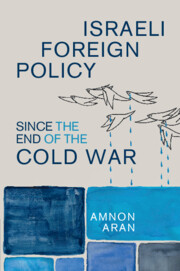Book contents
- Israeli Foreign Policy since the End of the Cold War
- Cambridge Middle East Studies
- Israeli Foreign Policy since the End of the Cold War
- Copyright page
- Dedication
- Contents
- Maps
- Figures
- Acknowledgements
- Chronology
- Abbreviations
- Maps
- Introduction
- 1 Entrenchment
- 2 Redirection
- 3 On the Brink of Peace?
- 4 Engagement Incomplete
- 5 Engagement under Assault
- 6 The Dividends of Engagement
- 7 Unpicking the Oslo Accords
- 8 Backtracking
- 9 Just Beyond Reach
- 10 Between Engagement and Unilateralism
- 11 In Search of a Foreign Policy Paradigm
- 12 A Perfect Storm
- 13 The Road Map for Regime Change
- 14 The Resurgence of Unilateralism
- 15 Events Dear Boy, Events
- 16 The End of the Road
- 17 Vulnerable Ties
- Epilogue: Israel’s Wondrous Decade?
- Appendix List of Persons Interviewed
- References
- Index
- Books in the Series
10 - Between Engagement and Unilateralism
Published online by Cambridge University Press: 15 December 2020
- Israeli Foreign Policy since the End of the Cold War
- Cambridge Middle East Studies
- Israeli Foreign Policy since the End of the Cold War
- Copyright page
- Dedication
- Contents
- Maps
- Figures
- Acknowledgements
- Chronology
- Abbreviations
- Maps
- Introduction
- 1 Entrenchment
- 2 Redirection
- 3 On the Brink of Peace?
- 4 Engagement Incomplete
- 5 Engagement under Assault
- 6 The Dividends of Engagement
- 7 Unpicking the Oslo Accords
- 8 Backtracking
- 9 Just Beyond Reach
- 10 Between Engagement and Unilateralism
- 11 In Search of a Foreign Policy Paradigm
- 12 A Perfect Storm
- 13 The Road Map for Regime Change
- 14 The Resurgence of Unilateralism
- 15 Events Dear Boy, Events
- 16 The End of the Road
- 17 Vulnerable Ties
- Epilogue: Israel’s Wondrous Decade?
- Appendix List of Persons Interviewed
- References
- Index
- Books in the Series
Summary
Chapter 10 explores the foreign policy of Israel towards the Middle East in the wake of the collapse of the Israeli-Syrian peace process, focusing on its relations with Iran, Lebanon, and the Palestinians. The chapter provides the first account of Israel’s foreign policy towards Iran, arguing that, by 2000, it had matured around four principles - deterrence, defence, interception, and support for multilateral efforts to curb Iran’s nuclear program. In addition, it is the first analysis to demonstrate how and why the demise of Israel’s foreign policy of engagement gave rise to its unilateralism foreign policy posture. The analysis shows that, despite nine years of negotiations, rigid historical, national and religious narratives, political opposition, and hostile public opinion, were still preventing a land-for-peace exchange to end Israel’s conflict with the Palestinians. Israeli-Lebanon relations were free of these shackles, which is why Ehud Barak was able to order the IDF to withdraw unilaterally from Lebanon. Barak’s foreign policy style, which was based on untying Gordian knots swiftly and decisively, was a clear advantage in this context, as domestic political conditions were ripe and international legitimacy was forthcoming.
- Type
- Chapter
- Information
- Israeli Foreign Policy since the End of the Cold War , pp. 215 - 238Publisher: Cambridge University PressPrint publication year: 2020

